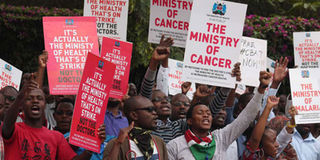Government’s war with doctors will not end well

Doctors demonstrate outside Supreme Court buildings on February 15, 2017. It is repeatedly claimed that doctors routinely steal medications from public facilities. PHOTO | DENNIS ONSONGO | NATION MEDIA GROUP
What you need to know:
- The final step in the triad consists of replacement of doctors with any other cadre that the governments feel they can more easily control.
- Last year, the government attempted to procure Tanzanian doctors to break the long drawn-out doctors’ strike.
Over the past few years, the relationship between the Kenyan government and its health workers has gone from bad to worse, perhaps resulting in a quiet policy shift that emphasises an attempt to decrease reliance on this crucial workforce.
Pronouncements from various quarters of both county and national governments have been too synchronised to be original and coincidental, and it is clear that a certain script has been shared in government on how to communicate about health workers, especially doctors.
One could summarise the insidious campaign against Kenyan doctors in three unfortunate words – demonise, minimise, replace.
Firstly, most government officials speaking about doctors have made it their business to repeat certain statements that are mostly untrue and aimed at spreading propaganda that makes doctors out as marauding profiteers motivated only by self-interest.
PRIVATE CLINICS
Stories about doctors working for only two hours a day and then leaving to focus on their private clinics have been repeated countless times since the President made the claim at the height of the doctors’ strike last year.
Other claims have been made that doctors routinely transfer patients from public facilities to their own private clinics in order to fleece them with exorbitant charges.
It is also repeatedly claimed that doctors routinely steal medications from public facilities and sell them in their own private pharmacies, all in pursuit of immoral profit.
The latest in the moves negatively targeting doctors has been a series of “exposés” suggesting that care in public hospitals is hopelessly broken down and that doctors are the main culprits in this.
Cases of patient ‘mismanagement’ have been endlessly highlighted in the media, with breathless journalists perhaps unaware that they are part of a bigger scheme to delegitimise the role of doctors in the healthcare system and begin thinking of a ‘life without doctors’.
HEALTH WORKERS
Already it has been boldly stated that doctors are useless at running health facilities, with little evidence being given to support the claim.
Ultimately, the goal of demonising doctors is to allow for the minimisation of their role in the health system.
We are increasingly hearing officials in government suggesting that the country can do without doctors.
At the very least, government has made a clear statement of the end of dealings with Kenyan doctors by wilfully neglecting to deploy newly registered doctors.
Indeed, a task-shifting ideology has caught on, with implementation that really suggests task-shirking on the one part (a reduction of doctors’ roles) and task-overloading on the other (other health workers who are being made to shoulder the doctors’ burden in the guise of ‘resource-limited settings’).
DOCTORS
As a result of this minimisation, we are seeing more and more wastage and abuse of health resources, with concomitant poor outcomes for patients.
The final step in the triad consists of replacement of doctors with any other cadre that the governments feel they can more easily control.
They argue that they pay these cadres less than they would have to pay doctors, and that they can carry out medical tasks just as well as any doctor would.
Further, they indicate that these cadres are less likely to engage in industrial action due to the degree of control the governments have over them.
In the extreme cases in which a doctor may be needed, it appears that government policy is to ‘import’ those doctors.
UNIVERSAL HEALTH COVERAGE
Cuba is only the latest recipient of the Kenyan government’s request for a “shipment” of doctors.
Last year, the government attempted to procure Tanzanian doctors to break the long drawn-out doctors’ strike.
Eventually only court action and reluctance by the Tanzanian Medical Association to get embroiled in Kenyan industrial politics ended the matter.
The pattern, however, was set, and the replacement ideology appears to be firmly entrenched in the government psyche.
While these moves might appear logical to a one-track-minded government official bent on punishing the hard-headed doctors, they are completely irrational to one who hears the government rhetoric on Universal Health Coverage and Sustainable Development Goals.
They are only indicative of a schizophrenic mind incapable of cognitive dissonance. This will not end well.
Atwoli is an associate professor and dean of Moi University School of Medicine. [email protected]





